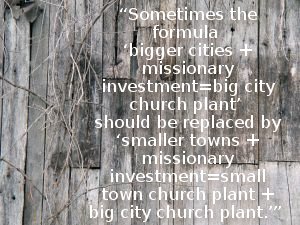The Hope of Hell? Justice is Being Served
 The following was written by pastor Charles J. Colton and is reprinted from Baptist Bulletin, November, 2007. It appears here unedited.
The following was written by pastor Charles J. Colton and is reprinted from Baptist Bulletin, November, 2007. It appears here unedited.
While some “cultural” Christians and others recoil at any notion of divine wrath—after all, God is love—the more Biblically literate understand the proper place of God’s retributive justice in the grand scheme of things. Most Christians understand how a doctrine of divine retribution serves as a warning to those who are unsaved, but it would appear that a far fewer number comprehend that the idea of divine retribution—which encompasses, among other things, a belief in Hell— affords the believer with considerable hope and comfort. At the very least, they seem unwilling to express that understanding.
Ordinary people want to know
Perhaps their silence reflects due caution. After all, what critic hasn’t already asked a thousand times, “How could a loving God have created a place called Hell?” Perhaps a reluctance to talk of Hell in any way that might be misconstrued as a bit gleeful is well considered. In my own experience, however, away from the “ivory towers” in which the critics ply their trade, ordinary people are asking just the opposite question: “Why does a loving God take so long to bring justice to hurting people?”
It may be that the events of September 11, 2001, have caused the majority of Americans to reconsider for themselves which is the more important question to ask. After all, what civilized person did not cry out to God for justice on that day, when a band of Islamist terrorists brutally murdered about three thousand people in Lower Manhattan, rural Pennsylvania, and Washington, D.C.? If there were calls for understanding toward the perpetrators, they were understandably drowned out.
Discussion
From Hillbilly to City Slicker, or The "Li'l Abner" Approach to Urban Missions
 Few people have ever captured and caricatured all levels of American society more successfully than did cartoonist Al Capp in his classic comic strip “Li’l Abner.” Arguably, the funniest sequences in the series are those where Abner, Mammy, or other members of the Yokum clan venture from their home in Dogpatch into the big city. There they interact with the urbanites, and hilarity ensues. For all of their sophistication and culture, the socialites can never seem to get the best of the hillbillies from the Ozarks.
Few people have ever captured and caricatured all levels of American society more successfully than did cartoonist Al Capp in his classic comic strip “Li’l Abner.” Arguably, the funniest sequences in the series are those where Abner, Mammy, or other members of the Yokum clan venture from their home in Dogpatch into the big city. There they interact with the urbanites, and hilarity ensues. For all of their sophistication and culture, the socialites can never seem to get the best of the hillbillies from the Ozarks.
The purpose of this article is to suggest that Al Capp—unwittingly, to be sure—suggests a viable model for rural/urban church planting.
In today’s evangelical world there is a heartening new emphasis on the church plant. Many of the efforts are being focused on urban centers—with works like Redeemer Presbyterian in New York or Mars Hill in Seattle being held up as examples for others to follow. Cities are the natural choice, it is argued, because they have more people, and because they set the culture for the rest of the world.
Based on those two facts, I heard one preacher affirm that all ministries (and the context was “church-planting”) should be city-focused.
While the above mentioned factors cannot be denied, I would like to suggest that they do not tell the whole story. Let me share two observations gleaned from my formative years in the US and our current ministry in Northeast Brazil.
Discussion
"If you feel any kind of anger, either toward the woman coming in for abortion or the clinic workers, then your best place is at home in prayer, not out there on the sidewalks."
Body
Abby Johnson, local Planned Parenthood director turned pro-life supporter, is Rod Dreher’s choice for Texan of the Year
Discussion